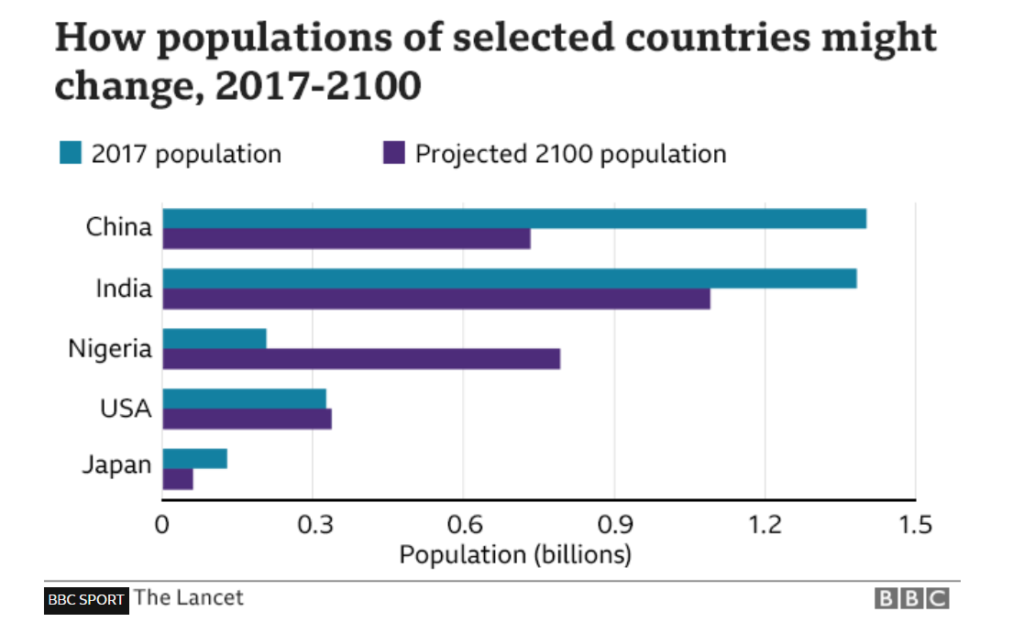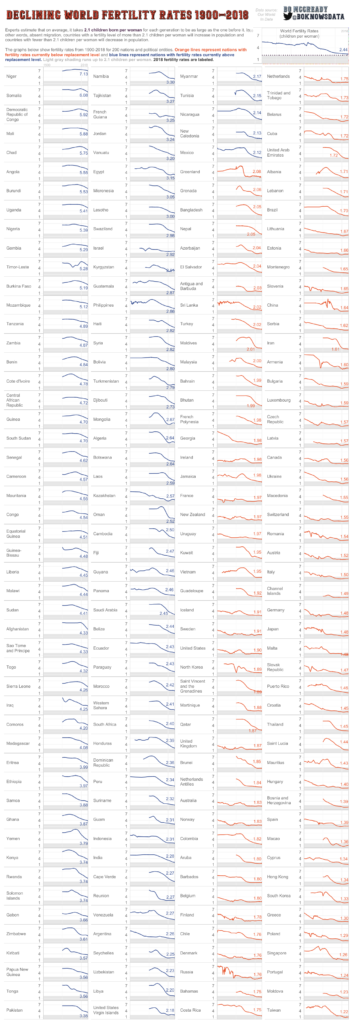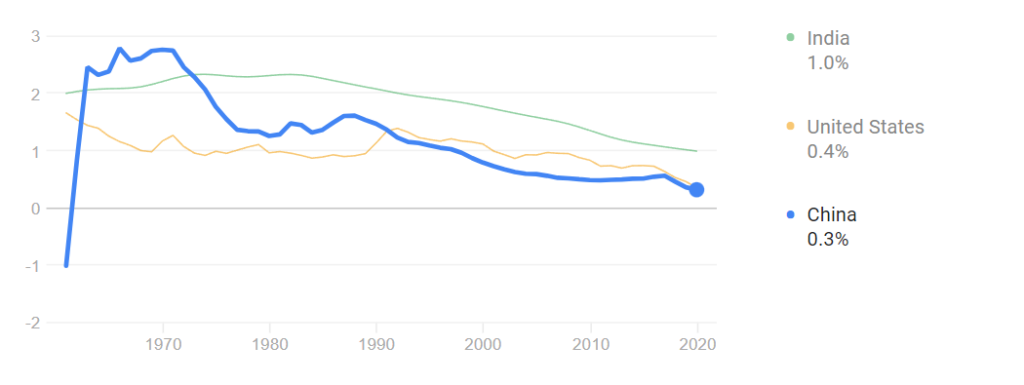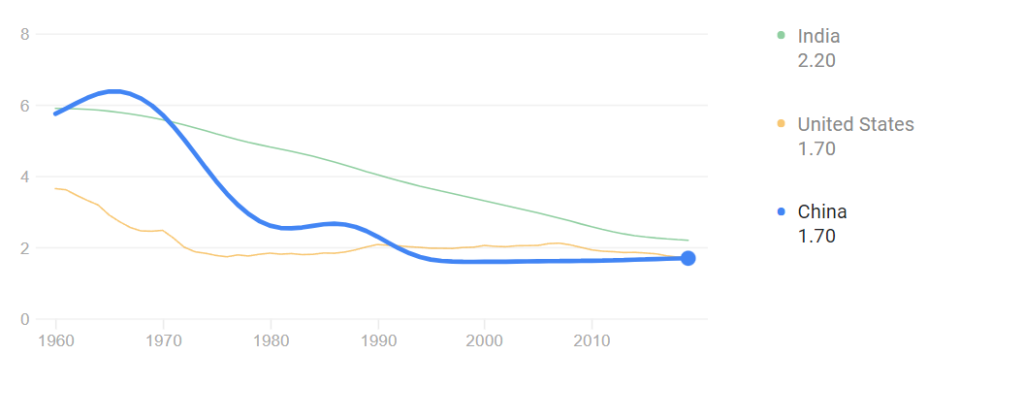Based on current trends, the US will reach a negative population growth rate by 2036. I just think that’s interesting. It’s also in the range period I defined as the 30 year bottleneck period, which is the result of global population possibly peaking, general AI, general labor robots, changes in aging, massive debt-to-GDP run-up, etc….
Today, countries like Japan, due to lack of immigration and low fertility rates, and Puerto Rico which hit a low of -4% last year alone, due to a variety of reasons like a poor economy, are already there. Of course, combine with Japan’s growing debt to GDP (highest in the world), it is likely that at some point, there will be an event horizon that will dramatically alter the current landscape of things.

If it is not clear already, the changing demographic situation (ratio of seniors to working adults) and decline in population are possibly the two largest influential variables in the modern world.
How Does China’s Population Growth Rate Compare?
While countries like India and much of Africa are still above 1%, super-power countries like the US and China are nearing zero. This is one main reason why I suspect China will not be a super-power in the future, given current trends. Of course, if fertility booms again in any country, and the politics are right (sorry China and Africa), then the option to lead will exist indeed. Recall that China’s net migration rate today is at a negative %, which just means no one really wants to move to China.
As you can see from the following, China had a much later drop in fertility rates than the US. I consider this one main reason their economy boomed in recent years compared to most countries, because you know: more workers equals more output. However, today their fertility rates are essentially on par with ours.
So what is holding up the US growth rate today? The fact its still the cleanest shirt in the dirty laundry in terms of places to immigrate and economic freedom/possibilities. But that is slowing too. Probably large in part due to slowing global growth rates in general, but its clearly not our fertility rates.
One of the most influential (German) population scientists Herwig Birg wrote to me “The rich countries with birth rates below replacement level established a system of in-migrations in order to replace births by immigrants. This policy is called “replacement migration”. In Germany the number of annual immigrations exceeds the annual number of births since 50 years. This is why I denote this system as “demographic colonialism”. This is a type of “hegemony” as you see it. In traditional colonialism exploitation took place by importing natural resources, in times of demographic colonialism exploitation concentrates on human resources.
Herwig Berg
Demographic Colonialism
Demographic colonialism is quite an interesting idea, however, unlike the economic colonialism, it is based on a free-market system and loose borders.
Logically, as countries seek to maintain their economic, political, and social success, the reality is that they will increasingly have to cater to their population’s whims, and offer more, in order to keep attracting more population. This could be delivered in a variety of ways, including negative ones, like offering more social programs via govt, which in turn just taxes the workers.
If programs are to sponsor childbearing, like free maternity leave, bonus payments for having children, note that the net effect is now only flawed since the taxes are just coming from these new children, but because in developed places like Sweden, Singapore, and China, this method just doesn’t motivate people to have children. The second method, offering more social benefits for seniors to attract seniors from other countries, or prevent them from leaving your country, this is also flawed due to the fact the money suporting the non-working population is coming from the relatively decreasing working population. In fact, Germany is doing both already, which is no surprise then that they are the 2nd most popular country to immigrate to today:
“any taxpayer living with child can get a child benefit (“Kindergeld”). Parents get it until the children turn 18, though it can continue until they are 25 if they still in school or meet other requirements for an extension. Parents receive a monthly payment of 190 Eur per child for the first two children, 196 Eur for the third child and 221 Eur for every subsequent child.
Remarkable considering that if the actual costs of raising each child generally decrease as you have more children, yet Germany pays you more for each child that you have, which just goes to show that few people are willing to have more than 1 or 2 children. I am guessing everything else there is heavily subsidized from education to school lunches, so the cost of having children is maybe approaching zero, but the fertility rates are still way below zero and population growth appears to have stalled for 20 years too.
I suspect this will eventually become a standard method for most aging countries of promoting childbirth, but with higher incentives. How many people would have more children today if the govt started paying you say, $1000 per month? Historically speaking, kids provided more value when they could work on the family farm, and today they just waste their free time with internet and video games–no surprise people see kids as increasingly expensive.
I do not know how this baby-subsidizing will pan out, as it has gone on in the US as well for decades, but if you are paying people to have babies, there is a risk that you are subsidizing the wrong populations and anti-evolutionary. Maybe I will go so far as to say that advanced socialism is what really wiped out ancient civilizations.
Advanced Countries May Just Become Freer Some Day
Perhaps I should say “aging” instead of “advanced” or “developed” countries, but I digress.
On the other hand, if social programs to attract populations do not work out, then a second possibility exists. My hypothesis says:
- If population decline is not a concern (usually because it is growing) then the result is greater restrictions, rules, and laws are placed upon that population. In short, freedom is reduced.
- If population growth is desired, or a population decline is a concern, then the result is just the opposite: fewer rules and greater freedom are the general outcome.
This is not just due to the fact that fewer people require less rules to function, but because you need to make your location more attractive to potential new inhabitants, which if they are not coming from fertility rates, then they need to come from immigration. And there are few better ways to increase immigration rates than to reduce restrictions while ensuring safety (although those two ideas are often mutually exclusive).
Otherwise, you lose your customers (a.k.a. your citizens) to other countries, especially in a world where mobility is clearly becoming greater (at least in the long run). Yes, countries like the US have already begun several practices making it increasingly difficult to expatriate (like the exit taxes), or even living in a forgiven country (FATCA which makes banking in almost any other country as an American almost impossible). So there is a possibility that the world becomes increasingly controlling to try to prevent losing citizens, but if Liberty holds true, it will not last, at least for the risk averse like the youth.
Losing your top talent workers to freer, more successful countries, is known as “brain drain.” For example, smart Chinese businessmen come here, bringing their money with them. Smart Americans of any kind rarely move to China permanently. Even my neighbor’s duaghter was put in prison as a English teacher teaching English–just not a welcoming place I’d day.
This situation could reverse if China adopted greater verbal and mental freedoms in addition to the economic freedoms they installed at the start of the post-Communist (well, soft- Communist) era. I do think it will happen, but it’s still a long ways off. But the other question is will China’s population start to fall faster than ours? Others think they will shrink must faster than my estimates, like the University of Washington’s Institute for Health Metrics and Evaluation thinks China will decline far faster. Now I did not try to calculate China’s time, but clearly they are falling faster than our numbers.

Perhaps you can see a bit of the migration possibility from state-based example. Generally speaking, the states with more population imports tend to have two factors in common: Generally freer, less socialized, and fewer people per square mile. Export states are the opposite. New York currently has the highest exit rate:

Sure, studies will claims lots of other reasons, like moving to be with family, quality of life, etc…, but deeper reasons are probably economic (does it make financial sense to live there) and political (are the laws beneficial to my life); otherwise you could just assume that ones relatives could just as well move to New York instead of the NY side leaving it.
Why Greater Freedom Appears to be a Likely Outcome in Most Countries Within the Next Few Decades
Let’s assume that given the current trends, countries will start losing populations in the next couple of decades. Initially, I do not think much will happen. Global political systems and hegemony’s do not change overnight. Existing structures and systems tend to stay in place longer than you expect, because replacing them is messy and undesirable.
Consider that GDP is the result of quantity (working population) time quality (how well, how smart) your workforce is, and you can maintain your power position for some time even with a declining population. Recall that “brain drain” imports are the highest here, which means we are importing the smartest people in the world. So maintaining the current system may exist even with a negative rate population, at least for a time. E.g. England remained a hegemonic power long after other countries with much larger populations surpassed them:
The focus on the changes in British GDP highlights a problem with the “declinist” school of thought; while critical, productivity had never been the main pillar of British power; rather it was Britain’s financial system that drove its rise to power. Prior to the nineteenth century, British production totaled only a fraction of its European rivals, particularly when compared with France, whose eighteenth-century population totaled nearly three times that of Britain while generating twice Britain’s GDP. It would not be until 1830, with the advent of the industrial revolution, that Britain would surpass France to become the Europe’s largest economy. Britain lost that advantage in the 1870s when it was outstripped by the more populous and rapidly industrializing United States.
And it’s even more complicated when you realize that every country on earth has decreasing fertility rates. In reality, unless some large land becomes some suddenly new desirable place to live, like how the US became in the last couple hundred years, then there may be no shift due to population decline, because relatively speaking, everywhere is declining.

Why My Estimates are Probably Inaccurate in the End
There is a bit of a hidden wildcard in all of these estimates, which is “life extension” technology. It’s hard to not see that as an actual possibility in the current century, and if that is the case, populations may increase again, or at least decrease at a much slower rate than the current trends.
Again, the other variable in major changes to future population shifts will be due to political, which is to say legal and power, changes.
When WW3 finally happens, there will likely be a baby boom after that too.

